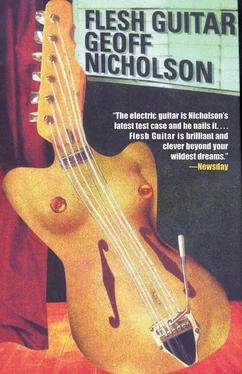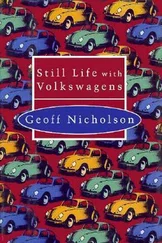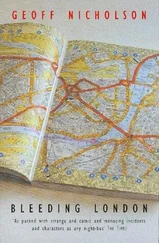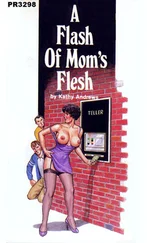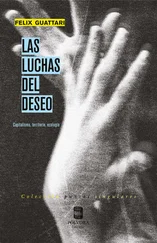‘Leo Fender was the first to mass-produce electric guitars. He made ’em cheap and he made ’em good. And if he hadn’t started producing them, then Gibson certainly wouldn’t have set up in competition, in which case Les Paul would never have been called in and the whole history of the electric guitar would have been different.
‘But note that I only say different. If Fender hadn’t been the Henry Ford of guitars, somebody else would have been. If Les Paul hadn’t invented that fat, eloquent humbucking sound, somebody else would. These things were simply bound to happen.
‘And after those few basic but crucial inventions, after those patents and practices, it didn’t really matter. After that, the deluge. After that there came tens of thousands of designers and inventors, craftsman and manufacturers, customizers and luthiers, all trying to “reinvent” the electric guitar. But basically they were all too late. The job had been done and the party was over. The rest was just tidying and sweeping up.’
‘You certainly know your history,’ Kate says.
‘Those who don’t know history are doomed to do bad cover versions,’ he quips. ‘Now, there’s a reasonable argument that says the best electric guitars are the biggest failures. You see, the pioneers of the electric guitar wanted a device that could reproduce the sound of an acoustic guitar as accurately and with as pure a tone as possible, so that it sounded exactly like an acoustic guitar only louder. But electric guitars never quite do that. They add muck and growl and distortion. And the strange thing is, people discovered they preferred it that way.’
Kate’s face shows confusion. She says, ‘Why would people prefer muck and growl and distortion to accuracy and purity?’
‘People are funny like that, Kate.’
Kate shakes her head sadly.
‘And that’s why they like effects too.’
‘Effects? As in special effects?’
‘In a way, yes. If people liked a fuzzy signal, why not make a little machine that could create fuzz to order? And chorus. And phase. And tremolo. And echo. And chorus. And so on and so on.’
‘The more the merrier,’ Kate adds glibly.
‘Frankly, merriness is not one of the things I’ve ever really looked for in music,’ says Bob. ‘But yes, when it comes to guitar noise, less is generally not better. Jenny Slade may be many things but she’s never been much of a minimalist.’
Kate considers this proposition and finds some truth in it.
‘The other element in all this is the amp,’ says Bob. ‘The guitar and the pickup and the effects units create and modify the signal, and then the amplifier messes it all up some more in its own special way, and cranks it out at skull-crushing volume.’
‘And people like that even more?’ Kate asks.
‘Yes, Kate, some people really like that a lot, believe me.’
‘Yes, I’ll buy that,’ says Kate. ‘Jenny Slade’s performance wouldn’t have been the same if it had been quiet.’
‘Look, Kate, here’s the true juice,’ Bob announces. ‘You can quote me on this. Life is like a guitar solo. It’s loud, shapeless and it goes on too long. Sometimes it’s tuneless, sometimes it’s cliched, either way it’s damned difficult to get it right, and even if you’ve done your best and you’re pleased with what you’ve achieved, you can be sure a lot of people are going to hate it and dump all over you and tell you you’re a loser.’
‘Aren’t you the philosopher?’ Kate says, not unkindly. ‘Do I really need to know all this background just to be able to appreciate Jenny Slade’s music?’
‘Yes, Kate, you do. Because once you know and understand the background you’ll see that the whole of history, of invention, of technical and artistic development, has existed for one reason and one reason only; to bring Jenny Slade to us.’
‘Whew,’ says Kate, ‘that’s heavy.’ And she reaches for a drink.
‘Heavy is the word,’ Bob agrees, and he holds out his empty glass so that Kate can refill it.
THE JENNY SLADE INTERVIEW
Bob Arnold chews the fat with Jenny Slade
Jenny Slade was looking especially good when I caught up with her in LA’s favourite watering hole, the Giant Anaconda Room. Her look was fearlessly eclectic: the bondage pants, the boob tube, the bolero jacket, the leopardskin pork pie hat, all creating a striking, provocatively sexual image that few could carry off. And yet why did I feel that these fine feathers were hiding a deep hurt? She might have looked like a major babe, but it seemed to me that she was blubbing inside.
I started with a lively and provocative question. ‘What happened to all your money, Jenny?’
‘Did I ever have any?’ she replied wearily. ‘Well, maybe I did. I don’t know where it went. I guess I spent it all on cheap boys and expensive guitars. Or perhaps it was the other way round; cheap guitars and expensive boys. I forget. Either way, I was never in it for the money, which I agree is perhaps just as well.’
‘And how long have you been playing the guitar?’
‘For about the same amount of time that the guitar’s been playing me,’ she quipped gaily, and I got the sense that here was one lady who wasn’t going to betray her age.
‘I think of you as a true radical,’ I said, getting bolder now. ‘Always out of step but never out of touch.’
‘Are you trying to say that I do not grow old as those who are left grow old?’ she intoned.
‘I think I’m trying to say that you have a different relationship to the space/time continuum than the rest of us poor mortals.’
‘Hmm,’ said Jenny, more seriously. ‘I will say this: as I get older the appetite for drink and drugs and untrustworthy boys recedes, but the urge to pick up an electric guitar and make a godawful noise just won’t go away.’
‘And would you say the guitar is a hard instrument to play?’ I quizzed provocatively.
She looked at me glancingly, and I knew there was going to be iron and irony in her reply.
‘Of course it is,’ she said. ‘If it was easy people like you would be doing it.’
I knew she meant it kindly and we laughed together like old buddies.
‘And who are your influences?’ I asked.
It was a corny old question but I knew Jenny would come up with a lively and original reply.
She thought for only a moment before replying, ‘Willa Cather, Margaret of Anjou, Lady Mary Wortley Montagu, Pamela Des Barres, those sort of people,’ and with that she grinned girlishly.
‘Do you feel in touch with the modern world?’ I challenged.
‘I feel in touch with Charlie Christian and Eddie Durham,’ she said. ‘With Muddy Waters and Chuck Berry and Hank Marvin and Duane Eddy, with Beck and Page and Clapton. With Guitar Slim and Johnny “Guitar” Watson and Clarence “Gatemouth” Brown. With Henry Kaiser and Bernard Butler and Noel Gallagher and Vernon Reid and Winged Eel Fingerling. Sexy fellers, every last one of them. And I feel in touch with women too — though in a different way.
‘But mostly I feel in touch with all those lonely boys of the future, still sitting in their rooms trying to play guitar, solemnly believing that if only they could coax some music out of the damn machine they’re holding then somehow everything would be better, everything would fall into place; their sex lives, their shyness, their bad skin. And you know what, fellers, you’re absolutely right, it would.’
There was a poignant pause while she let that remark settle in.
‘You know,’ she added briskly, ‘it’s a long time ago that I decided to be my own woman, my own musician. I decided I was going to tear up the rule book, and then I realized there was no rule book.’
Читать дальше
